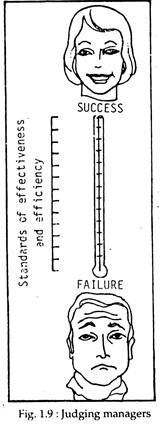This article throws light upon the two main aspects of manager’s role in an organisation. The aspects are: 1. Accountability 2. Effectiveness and Efficiency.
Aspect # 1. Accountability:
The difference between managers and other people in the organisation is that only managers are held responsible, or accountable, not only for their own work but also for the work of others. Stoner has rightly pointed out that since “managers have subordinates and other resources in getting a job done, they are able to accomplish more than non-managers, who have only their own efforts to rely on”.
The implication is clear:
“the managers are expected to accomplish more than other members of the organisation, that is, they are also held accountable for greater achievement”. However, an important point to note here is that there is an element of risk involved in a manager’s work.
It is because the manager has to rely on others to get things done. Thus managers are always held responsible for achieving things which are beyond their immediate control. This often becomes a source of anxiety for them.
Aspect # 2. Effectiveness and Efficiency:
Our definition suggests that managers get things done by others. But no mention has been made so far about the responsibility of managers to perform well. In this context, P.F. Drucker has suggested that a manager’s performance can be measured in terms of two related concepts- efficiency and effectiveness. Efficiency means ‘doing things right’ and effectiveness means ‘doing the right thing’.
It may be mentioned that efficiency (or the ability to get things done correctly) is basically an input-output concept. If a manager succeeds in minimizing the cost of the resources he(she) uses to reach a particular goal he(she) is said to be acting efficiently.
Moreover, the major input of an organisation is its people (i.e., its labour and talent). Efficiency might also mean developing or upgrading the people who do the work. It is just keeping costs down by economising the use of labour inputs. See Fig. 1.9.
On the contrary, effectiveness is “the ability to choose appropriate objectives or the appropriate means for achieving a given objective”.
To put the same thing in a different language, an effective manager is one who selects the right things to get done or the right method for getting a particular thing done. For example, a manager who insists on producing only black and white T. V. sets when the demand for colour T.V. sets is increasing very fast is supposed to be an ineffective manager, even if he achieves efficiency by producing black and white T.V. sets at the lowest possible cost (or with maximum possible efficiency).
Needless to say, the responsibilities of a manager require performance that is both efficient and effective. As Drucker has argued, although efficiency is important, the key to the success of an organisation is effectiveness.
He has suggested that the manager’s need to make the best possible utilisation of existing opportunities “implies that effectiveness rather than efficiency is essential to a business. The pertinent question is not how to do things right, but how to find the right things to do, and to concentrate resources and efforts on them”.
